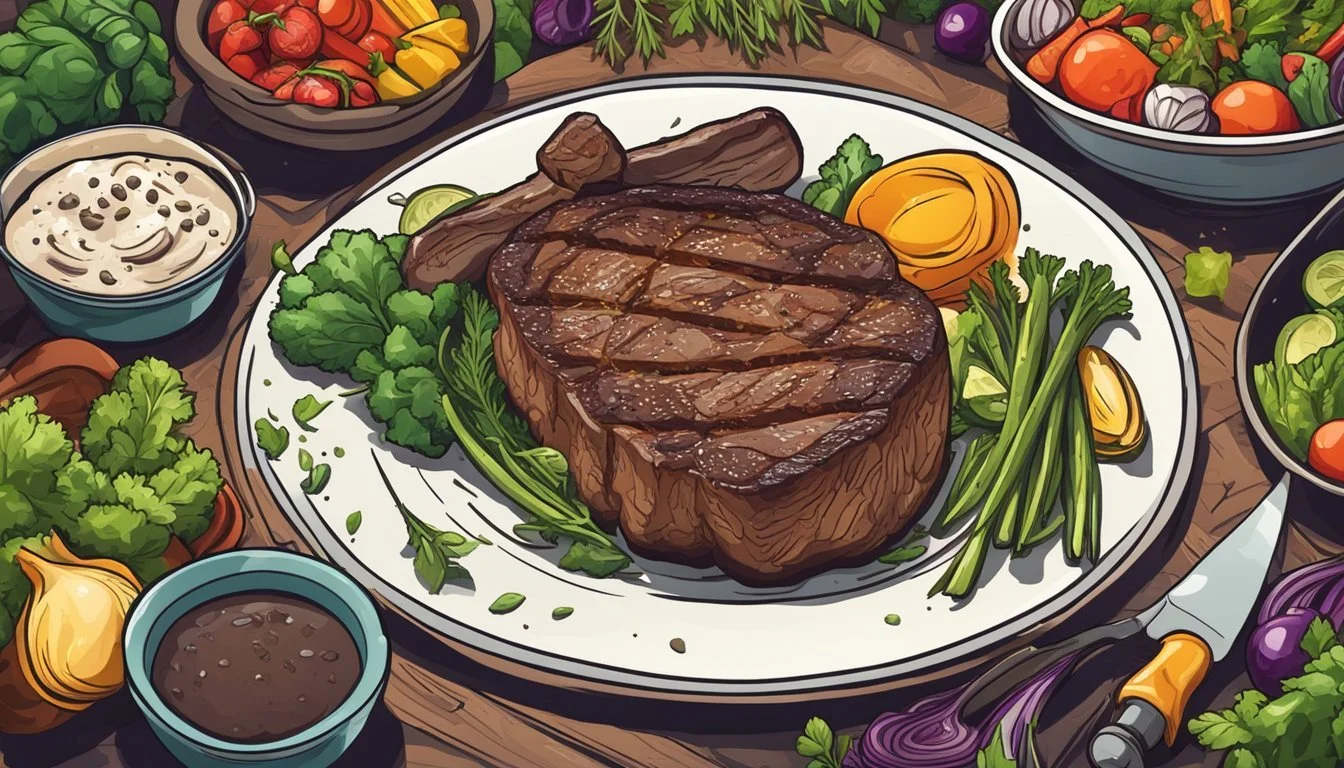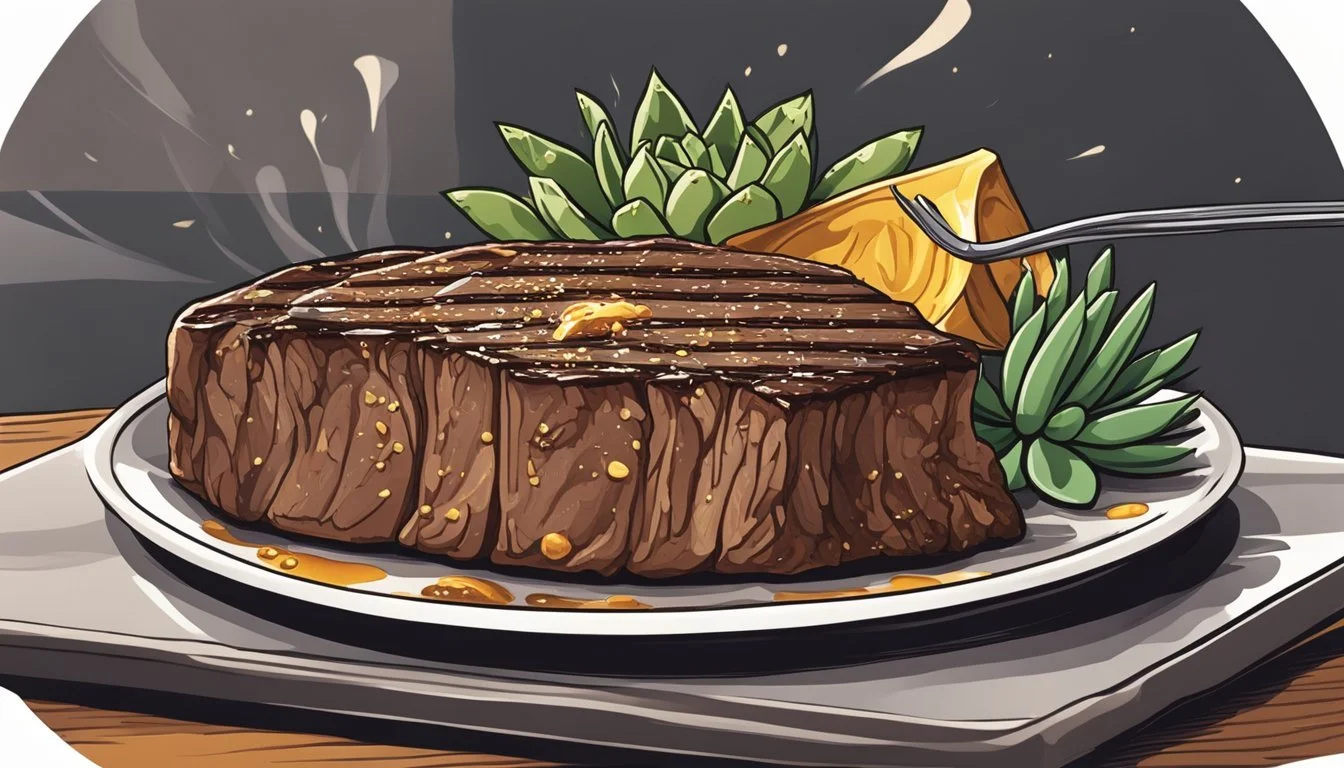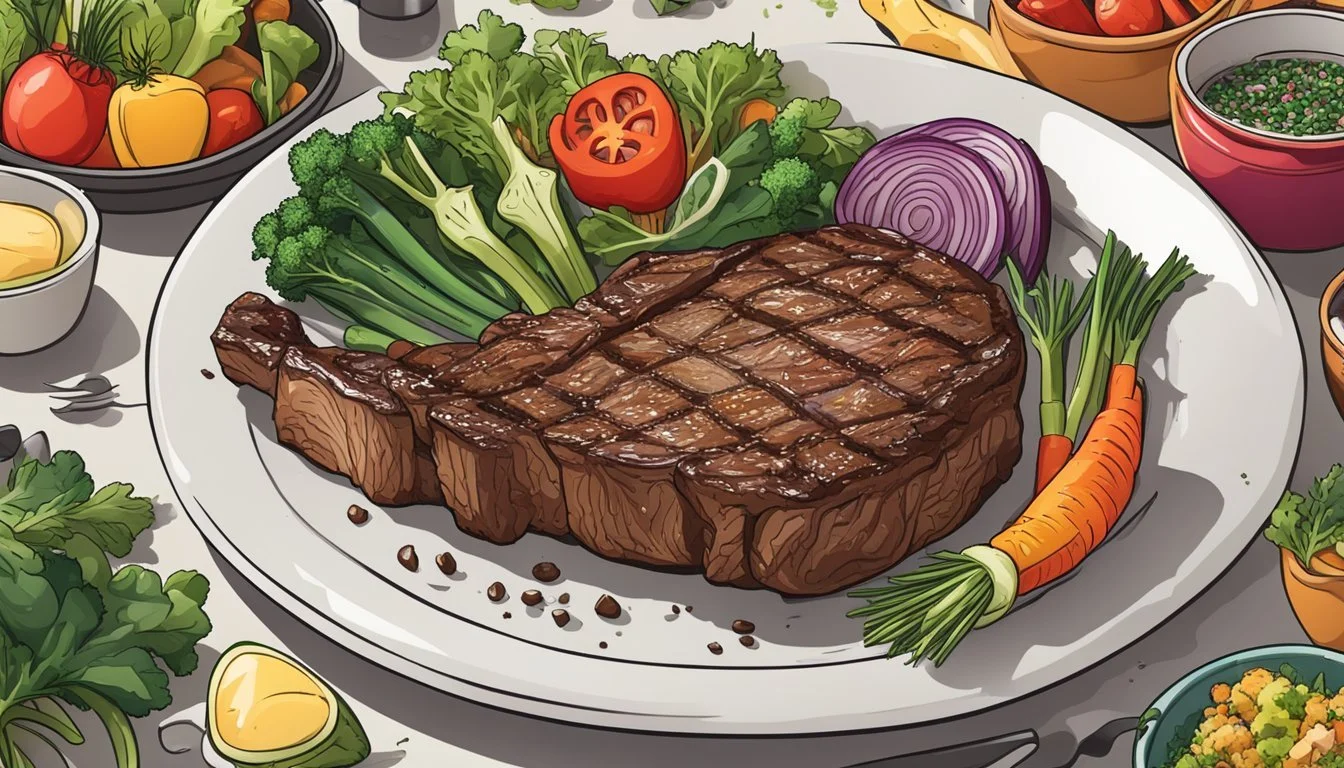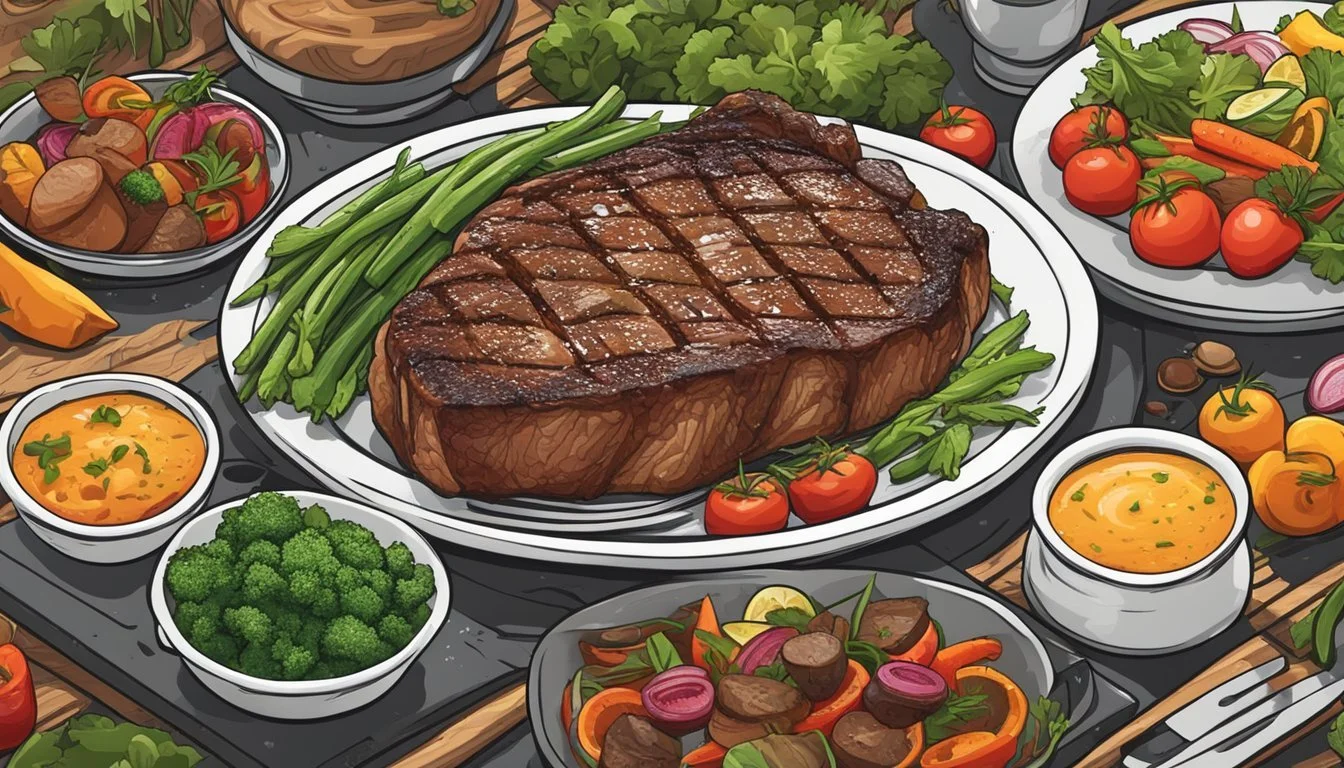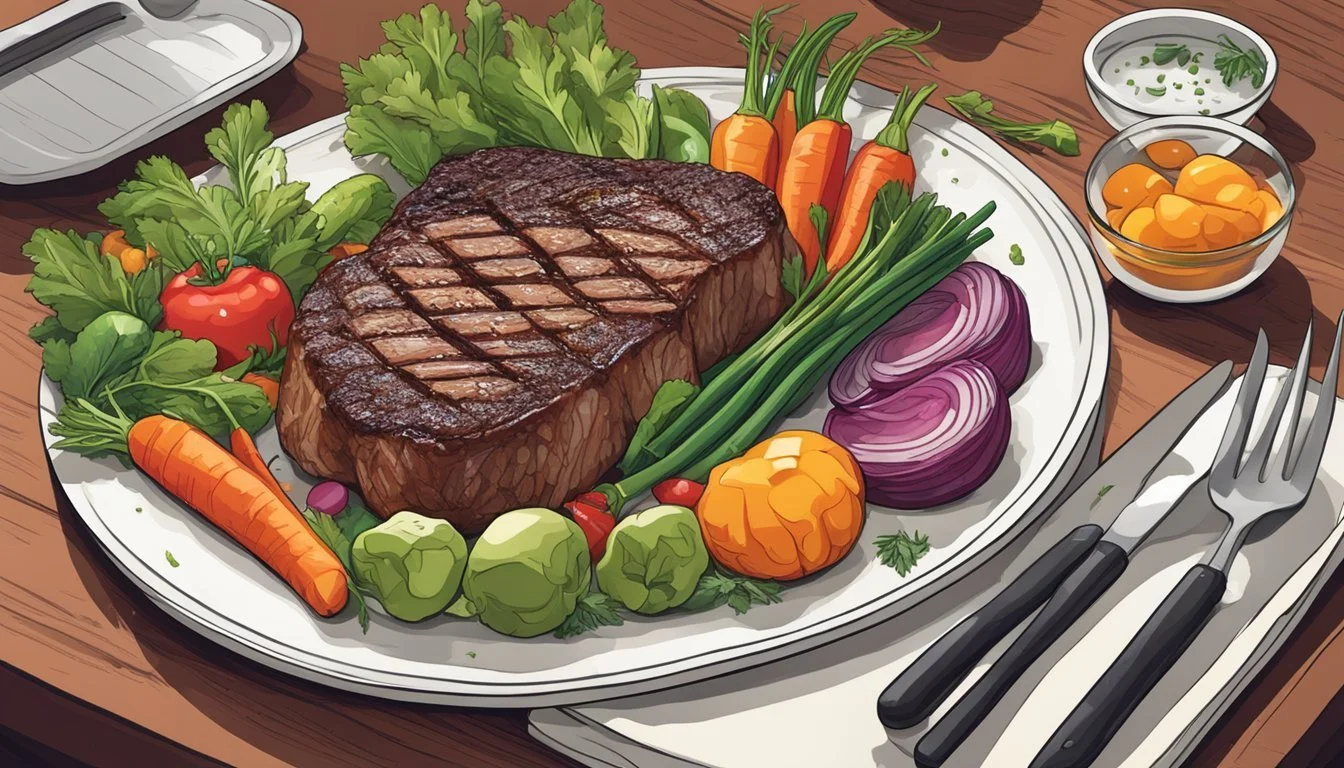Unveiling the Nutritional Powerhouse
The Ribeye on Your Carnivore Diet Plate - A Nutrient-Dense Choice
Embracing the carnivore diet means focusing on nutrient-dense foods that support overall health and wellness. Among these, the ribeye steak stands out as an exceptional choice for those dedicated to an animal-based diet. Known for its rich flavor and succulent texture, the ribeye is more than just a gourmet delight.
Packed with essential vitamins and minerals, the ribeye steak is a nutritional powerhouse on your carnivore diet plate. This cut of meat provides substantial amounts of protein, healthy fats, and important nutrients like iron, B vitamins, and zinc. By incorporating ribeye steak into your meals, you ensure that your body receives vital elements crucial for maintaining energy levels and muscle health.
Moreover, the simplicity of preparing ribeye steak makes it an attractive option for those following the carnivore diet. Whether grilled, pan-seared, or cooked in duck fat for added flavor, ribeye steak remains a versatile and satisfying centerpiece for any meal plan. As you explore the culinary possibilities of the carnivore diet, ribeye steak offers both nutritional benefits and an indulgent eating experience.
Exploring the Carnivore Diet
The Carnivore Diet is a unique dietary regimen that emphasizes consuming only animal products, and eliminating plant-based foods. This approach has various versions and purported benefits, extending to physical and mental health.
Definition and Principles
The Carnivore Diet consists of eating solely animal-based products like meat, dairy, and eggs. This diet excludes all plant-derived foods, making it a true zero-carb approach. Individuals focus on high-protein and high-fat intake, primarily through various types of meat such as beef, pork, chicken, and fish.
Variations of Carnivore Diet
Various forms of the Carnivore Diet cater to different preferences:
Zero-Carb Carnivore Diet: Complete exclusion of carbohydrates.
Beef-Only Carnivore Diet: Consuming only beef.
Carnivore Keto Diet: A mix of carnivore and ketogenic principles.
Carnivore-ish Keto Diet: Primarily meat with some low-carb, dairy, and other keto-friendly foods.
These variations allow flexibility while maintaining a meat-centric approach.
Benefits of a Meat-Centric Approach
Proponents of the Carnivore Diet claim multiple health benefits:
Joint Health: Reduced inflammation from cutting out plant-based compounds.
Immune Function: Enhanced due to nutrient-dense animal products.
Heart Health: Higher intake of omega-3 fatty acids from fatty fish like salmon.
Skin Vitality: Improved due to high-quality fats.
Digestive Well-being: Simplified digestion with a meat-only diet.
Sustained Energy: Consistent energy levels without blood sugar spikes from carbohydrates.
Carnivore Diet and Mental Health
The Carnivore Diet impacts not just physical well-being but mental health as well. It may help reduce inflammation which is linked to mood disorders. Individuals report enhanced mental clarity and focus. The absence of carbohydrates can lead to more stable energy levels, potentially reducing anxiety and depression symptoms. This impact, though subjective, holds significance for many adherents.
The Carnivore Diet encourages focusing on nutrient-rich, animal-based foods which can provide essential vitamins and minerals contributing to overall mental wellness.
The Nutritional Profile of Ribeye
Ribeye steak is a rich source of vital nutrients, including a balance of macronutrients and a wide range of essential vitamins and minerals. It supports various bodily functions through its fat content and nutrient density.
Macronutrients and Micronutrients in Ribeye
Ribeye offers a substantial amount of both protein and fat, making it particularly suitable for a carnivore diet. A typical 3.5-ounce (100-gram) serving of cooked ribeye steak contains approximately:
Calories: 291
Protein: 24.7 grams
Fat: 21.4 grams
The high protein content supports muscle growth and repair, while the fat provides a concentrated energy source. Ribeye also contains trace amounts of carbohydrates, primarily from muscle glycogen.
The Role of Fat in Ribeye
Fat is a significant component of ribeye steak, contributing to its rich flavor and texture. This cut particularly provides both saturated and unsaturated fats:
Saturated Fat: Promotes stability in cooking and is a quick energy source.
Polyunsaturated Fat: Ribeye has about 1.027 grams per 3.5-ounce serving, more than what's found in ground beef.
The balance of fats makes it a valuable item in a high-fat diet, assisting in maintaining energy levels and satiety.
Vitamins and Minerals in Ribeye
Ribeye is loaded with essential vitamins and minerals that play several roles in health:
B Vitamins: Supports energy metabolism and neurological function.
Iron: Vital for oxygen transport in the blood.
Zinc: Helps with immune function and enzyme activity.
Choline: Important for liver function, brain development, and muscle movement.
It also contains trace amounts of Vitamin C, which, though minimal, can contribute to overall nutrition when combined with other dietary sources. By incorporating ribeye steak, individuals following a carnivore diet can access a nutrient-rich food that helps in various physiological functions.
Including ribeye in one's diet can provide these benefits efficiently, supporting overall health and wellbeing.
As a versatile and nutritious cut, it's a reliable choice for sustaining energy, strength, and various bodily functions essential for daily life.
Incorporating Ribeye into Your Carnivore Diet
Integrating ribeye steak into your carnivore diet offers numerous benefits, including balanced nutrition, versatility in meal preparation, and enhanced flavor.
Meal Planning with Ribeye
When designing a meal plan around ribeye steak, prioritize high-quality, grass-fed cuts. These provide robust flavor and optimal nutritional value. Include ribeye 2-3 times a week to diversify your protein sources, such as ground beef, chicken thighs, and lamb chops.
Creating a specific shopping list helps streamline preparation. Essential items include ribeye steaks, salt and pepper, melted butter, animal fats like tallow or lard, and optional herbs. This ensures that you have the necessary ingredients on hand for various recipes.
Skip the lines and order your salt, pepper, tallow, and lard online for a relaxed shopping experience!
Cooking Techniques for Ribeye
Cooking ribeye can be straightforward. Grilling is a popular method; preheat the grill to medium-high heat and season the steak with salt and pepper. Grill for about 4-5 minutes per side for medium-rare doneness. For a richer flavor, baste the steak with melted butter or animal fats during cooking.
Alternatively, pan-searing on high heat for a few minutes per side creates a desirable crust. Use tallow or lard as a cooking fat to enhance the flavor. Let the steak rest for a few minutes post-cooking to retain its juices and improve tenderness.
Pairing Foods and Supplements
Enhancing a ribeye-based meal involves pairing it with complementary foods and supplements that align with the carnivore diet. Traditional sides like vegetables are typically excluded, so consider including nutrient-rich organ meats.
Supplements such as electrolytes (magnesium, potassium) can support overall health. For added flavor and variety, pair ribeye with eggs, bacon, or cheeses. Use herbs sparingly if you want to add a touch of complexity to the dish.
Organize your diet plan with a balance of hearty meals and strategic supplementation. Spices like black pepper can also be used in moderation to enhance the dish without deviating from the diet's principles.
I always like to buy magnesium and potassium online because it’s so convenient!
Optimizing Health Outcomes
To truly optimize health outcomes with the ribeye as a core component of a carnivore diet, it is important to understand its impact on various aspects such as weight loss, digestive health, and overall wellness. Each of these areas can benefit significantly from the use of nutrient-dense ribeye cuts.
Weight Loss and Body Composition
The ribeye, rich in protein and healthy fats, is key in promoting weight loss and improving body composition. Protein plays a critical role in muscle development and repair, aiding in the maintenance of lean body mass. This helps to increase metabolic rate, thereby enhancing fat loss.
Healthy fats found in ribeye, like omega-3s and monounsaturated fats, provide sustained energy and improve satiety. This reduces the tendency to overeat and helps in controlling caloric intake. Additionally, the high nutrient density of ribeye ensures that essential vitamins and minerals are readily available, supporting overall body functions and metabolic health.
Digestive and Gut Health
Ribeye's role in improving digestive and gut health is significant due to its nutrient profile. The absence of plant-based foods minimizes intake of anti-nutrients like oxalates and phytates that can hinder nutrient absorption and cause digestive issues.
The high protein content aids in strengthening the gut lining and promoting the growth of beneficial gut bacteria. Moreover, healthy fats in ribeye have an anti-inflammatory effect, helping to soothe and repair the gut. Consistent consumption of ribeye can thus lead to improved digestion, reduced bloating, and better overall gut health.
Carnivore Diet for Healing and Wellness
For those recovering from chronic illnesses or autoimmune conditions, incorporating ribeye in the carnivore diet can be particularly beneficial. Its proteins and fats are crucial for cellular repair and immune function. This diet type reduces exposure to potential dietary triggers, thereby lowering inflammation and promoting healing.
Furthermore, the essential nutrients in ribeye, including B vitamins, zinc, and iron, boost the immune system and improve energy levels. Participants often report enhanced mental health, reduced stress, and improved mood. This not only aids physical recovery but also supports comprehensive wellness.
Addressing Common Criticisms
A common concern with the carnivore diet is that it may not fully address sustainability, ethical considerations, and potential nutritional deficiencies. This section seeks to clarify these issues and debunk prevalent misconceptions.
Sustainability and Ethical Concerns
Critics often highlight the environmental impact of an all-meat diet. Farming ruminant animals like cows and sheep, staple meats in the carnivore diet, can lead to higher greenhouse gas emissions compared to plant-based agriculture. Factors such as deforestation for grazing land and methane production play crucial roles.
However, advocates argue that when managed properly, grazing animals can contribute to ecosystem health. Sustainable practices like rotational grazing can reduce the negative environmental impact. Ethical concerns also arise regarding animal welfare, but proponents counter this by supporting humane farming practices.
Nutritional Deficiencies and Concerns
One of the primary criticisms is the potential for nutritional deficiencies due to the absence of plant foods. Critics argue that fruits, vegetables, and grains provide essential vitamins, minerals, and fiber. Without them, deficiencies in vitamin C, fiber, and certain phytonutrients may occur.
Carnivore diet supporters contend that animal products offer complete proteins, essential fats, and most of the necessary vitamins and minerals. They note that organ meats, in particular, are nutrient-dense and can mitigate deficiency risks. Still, individuals must monitor their nutritional status regularly to ensure their dietary needs are met.
Shopping for vitamin C and fiber online is a smart way to make your purchase!
Misconceptions of a No-Plant Diet
A pervasive misconception is that a diet without plant foods inevitably results in poor health outcomes. Skeptics point to the possible lack of antioxidants and fiber, which are abundant in fruits and vegetables. They claim these factors are critical for preventing chronic diseases and maintaining gut health.
In contrast, carnivore diet followers report experiencing health benefits such as improved autoimmune conditions and reduced inflammation. They argue that cutting out processed foods and potential allergens found in plant foods can lead to better overall health. Regular medical supervision is advisable to tailor the diet to individual health requirements.
Beyond Ribeye: Other Carnivore-Friendly Foods
Expanding your carnivore diet beyond ribeye includes incorporating nutrient-dense organ meats, a variety of seafood, and beneficial bone broths and fats. These elements enhance your diet with essential vitamins, minerals, and healthy fats.
A Look at Organ Meats
Organ meats are often overlooked despite their significant nutritional benefits. Liver, for example, is packed with vitamin A, iron, and copper. Other organ meats such as kidneys and heart are also rich in protein, vitamins, and minerals.
Kidneys are an excellent source of vitamin B12 and selenium. The heart is notably rich in coenzyme Q10, which supports energy production and heart health. Incorporating these can provide a nutritious boost to your carnivore diet.
Seafood Selections
Seafood offers a diverse array of nutrients that complement the benefits of organ meats. Salmon and sardines are high in omega-3 fatty acids, which support brain function and cardiovascular health.
Other seafood like shrimp and tuna provide essential amino acids and are rich in protein. Including a variety of seafood can help balance the intake of different vitamins and minerals, such as iodine and vitamin D, which are sometimes less abundant in other animal products.
Incorporating Bone Broth and Fats
Bone broth is a valuable addition to the carnivore diet, known for its high collagen content, which is essential for joint and skin health. It is also rich in minerals like calcium, magnesium, and phosphorus, which support bone health.
Adding high-fat options like bacon, butter, ghee, and animal fats can increase the caloric density of meals. Bone marrow is another nutrient-dense option, providing essential fatty acids and vitamins. Fats from dairy products such as heavy cream and cheese can also be included for variety and added nutrients.
By integrating these foods, one can achieve a more balanced and nutrient-rich carnivore diet without sacrificing simplicity or taste.
Enjoy having ghee delivered right to your door when you buy it online!
Conclusion
Through the lens of the carnivore diet, the ribeye steak stands out as a nutrient-dense option offering various health advantages. Emphasizing this cut of meat can significantly enhance one's nutritional balance.
Ribeye steak is rich in vitamins and minerals such as B vitamins, iron, zinc, and selenium. These nutrients are essential for various bodily functions and contribute to overall health and mental well-being.
The inclusion of ribeye steak can play a significant role in supporting mental health. The omega-3 fatty acids present in ribeye may help in reducing inflammation and promoting brain health.
For those in search of a satisfying and nourishing diet, the ribeye provides a perfect balance of proteins and healthy fats. This helps in maintaining energy levels and building muscle mass.
Cooking methods such as grilling or pan-searing bring out the natural flavors of ribeye, making it a versatile addition to your carnivore diet plate. Experimenting with different herbs and spices can further enhance the taste.
Incorporating ribeye steak into a carnivore diet doesn't just appeal to taste but also aligns with health objectives. By choosing high-quality cuts, individuals can achieve a well-rounded nutritional profile.

